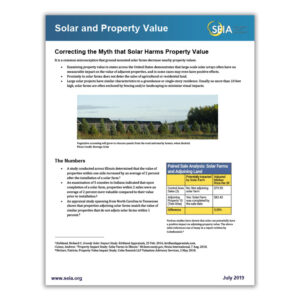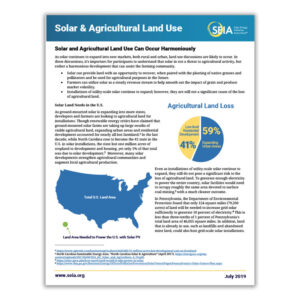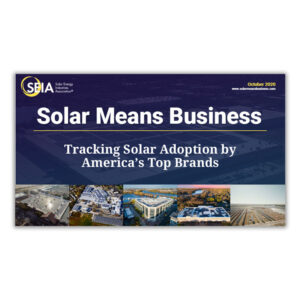
Solar & Property Value: Correcting the Myth that Solar Harms Property Value
Solar Energy Industries Association
If you’re reading this, likely, you’re not a solar energy expert—and that’s perfectly fine. Our mission is to clarify this process and offer the best support to landowners. We’re dedicated to providing context, answering questions, and educating you to help you make informed decisions.

Solar Energy Industries Association

Solar Energy Industries Association

Solar Energy Industries Association
Every industry has its jargon, and solar energy is no exception. To assist you, we’ve compiled a Glossary of standard terms. If there’s a term you need help understanding or needs to be added, please let us know, and we’ll explain it and add it to the list.
Feel free to refer to this glossary to enhance your comprehension of the terms you’ve encountered. Should you have any additional questions, don’t hesitate to contact us—we’re more than happy to assist.
A single entity best holds this type of coordination/handled management to ensure the process works seamlessly and meets deadlines, budgets and expectations. It is also effective as it guarantees fairness to both suppliers and customers.
This is an investigation of a property’s current and historical uses to determine if any unseen environmental problems could cause challenges in the future.
Through an agreement like this, properties are exempt from property taxes. Instead, state and local agencies will calculate and bill a PILOT payment.
A solar power source that is larger than a standard single-home solar power system. This PPS is also connected to a commercial grid for many homes or commercial use.
This is a long-term agreement between the “customer” (the entity buying the energy) and the energy producer that supplies the renewable energy. These agreements are designed to protect both parties from fluctuations in energy prices.
Renewable energy refers to any source of energy that is not depleted, such as wind and solar power. Using renewable energy mitigates climate change and stabilizes energy security.
A survey is a graphic layout of the property, its features, and legal boundaries. This is useful for solving issues, resolving problems and clarifying any disputes about the property.
This process involves investigating a property’s title and anyone’s legal claim before an agreement can be entered into. This is a critical step to avoid potential issues.
“AHJ” stands for “Authority Having Jurisdiction.” These permits are necessary as some entities may have jurisdiction over a property. They usually refer to local building codes, fire codes and other regulations a property is subject to.
It is defined as anything greater than 1MW. This solar usually comes from a photovoltaic power station (solar farm). Rooftop solar is usually considered private-use solar as it is not big enough to be considered “utility-scale” solar.
Here, we’ve compiled answers to some of the most common queries we receive to help you find the information you need quickly and easily. Whether you’re looking for general details or specific answers, this section is designed to provide clear and concise explanations. If you can’t find what you’re looking for, please don’t hesitate to contact our support team for further assistance.
Solar leasing is a contractual agreement where a landowner allows a solar energy company to install and operate solar panels on their property in exchange for lease payments. The company handles the solar system’s installation, maintenance, and operation. The landowner collects rent on the property in return.
Leasing your land for solar can bring a host of benefits, including a steady income stream, minimal maintenance requirements for the landowner, and the opportunity to contribute to renewable energy production and environmental sustainability. The reliable stream of solar income can help you diversify your interests and secure the economic future for your farm, while also making a positive impact on the environment.
Azimuth Renewables can begin working to develop a solar farm on your land with as little as 25 acres. Larger utility-scale solar farms often engage many landowners to gather more extensive tracts of usable land together.
Azimuth leases last for 20 years with two optional extensions of 10 years each.
Key considerations include the suitability of your land for solar development. We look for sites with relatively flat land not in a flood zone or wetland. The site must have access to electrical infrastructure, and we prefer sites within 2 miles of a substation.
Lease payments are typically based on the solar installation size, the electricity generated, or a fixed annual rate. Payment structures can vary based on state and local conditions, tax incentives, and the needs of the local electrical utility.
Lease agreements should include provisions that protect the landowner if the solar company goes out of business. This may involve securing a performance bond or insurance policy to cover decommissioning costs or transferring the lease to another qualified operator. Many State and local regulations require projects to post decommissioning security to protect landowners, ensuring your peace of mind.
Solar farms have relatively low environmental impacts compared to other forms of energy production. Proper site selection and management practices can mitigate the environmental impacts that may arise from changes in land use and operation of a solar farm. Solar energy reduces our reliance on carbon emissions and fossil fuel energy production.
The solar company is typically responsible for the maintenance and eventual decommissioning of the solar farm. Lease agreements should specify the obligations and responsibilities of the solar company regarding the upkeep and removal of the solar equipment at the end of the lease term.
Leasing your land for solar may have tax implications, including potential changes in property tax assessments and income taxes on lease payments. It’s essential to consult with a tax advisor to understand the specific impacts on your financial situation.
Working with experienced legal and real estate professionals can help protect your interests. Azimuth Renewables works hard to ensure that landowners feel well-represented and that their interests are protected before we ever sign a lease.
Start by reviewing the lease terms and conditions sent to you by an Azimuth representative. After reviewing the lease terms and agreeing, we will sign a lease. Once the lease is signed, Azimuth will record a memorandum with your local county recorder. Please see our Project Development Roadmap for details on developing a solar farm once we have agreed to a lease.
Do you have questions about the ways solar can benefit you and your land? Contact Azimuth Renewables to speak with our dedicated team and discover how solar leasing can benefit you and your land.
Azimuth Renewables—Powering a sustainable future, one partnership at a time.

